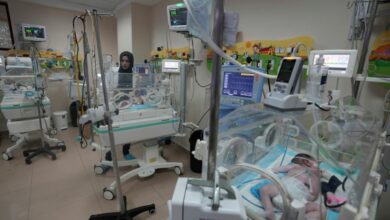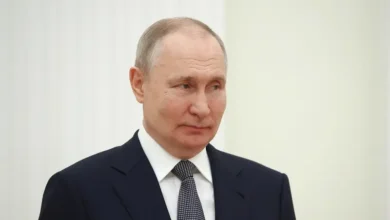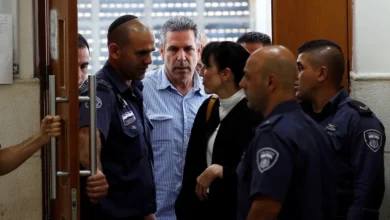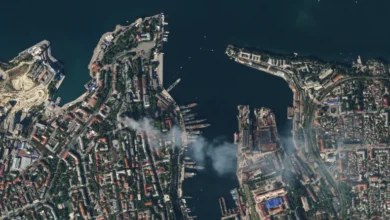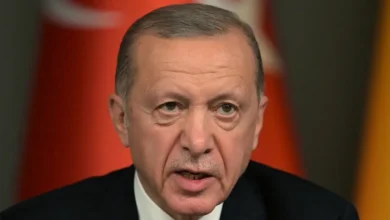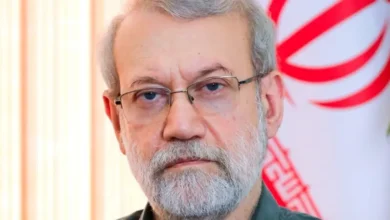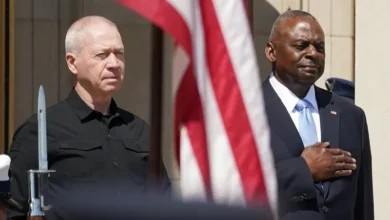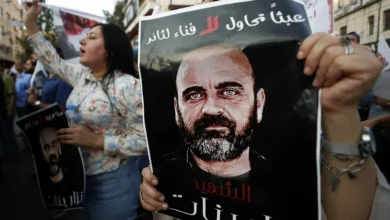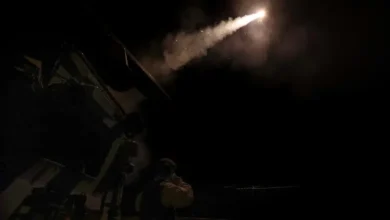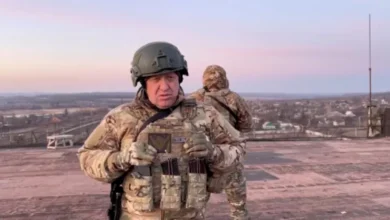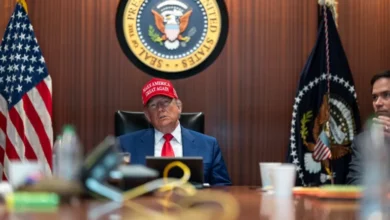‘Unimaginable consequences’: World reacts to Israel’s strikes on Lebanon
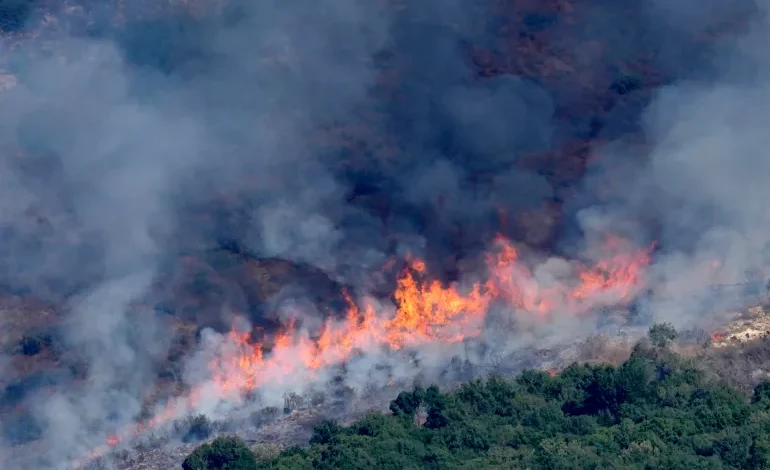
World leaders are sounding the alarm about a “full-fledged” war, calling for de-escalation after devastating Israeli air strikes in Lebanon ratcheted regional tensions amid Israel’s ongoing war on Gaza.
The attacks, which started on Monday and continued into Tuesday, were Israel’s fiercest against its northern neighbour and have led to Lebanon’s highest single-day death toll since the end of the 1975-90 civil war.
On Tuesday, Lebanon’s Ministry of Public Health said the Israeli strikes killed 558 people, including 50 children and 94 women. Health Minister Firass Abiad told a press conference in Beirut that at least 1,835 people were wounded, and 54 hospitals are treating patients.
Here are some reactions:
United Nations
Secretary-General Antonio Guterres said he was “gravely alarmed by the escalating situation along the Blue Line”, referring to the demarcation line dividing Lebanon from Israel and the occupied Golan Heights, as well as “the large number of civilian casualties”.
“It’s clear that the people of Lebanon, the people of Israel and of the region cannot afford a full-scale war,” he said, adding that UN representatives were on the ground to push for a diplomatic solution.
Ravina Shamdasani, spokeswoman for the UN Human Rights Office, said, “International humanitarian law is very clear. All parties to an armed conflict must at all times distinguish between the civilian population and combatants and between civilian objects and military objectives.”
In a statement that said “the laws of war also oblige all parties to observe the principle of proportionality”, Shamdasani called for independent and transparent investigations into incidents in which civilians were killed or seriously wounded.
UNICEF head Catherine Russell highlighted the “dangerous escalation” that threatens “countless” children.
“Alarming levels of psychological distress” have also been reported among children due to displacement and from the barrage of shelling and air raids, she said, calling for an immediate de-escalation.
Iran
Iran, an ally of Lebanese group Hezbollah that Israel says it is targeting, accused Israel of trying to bait it into a conflict that would have “irreversible consequences”.
President Masoud Pezeshkian said: “We want to live in peace, we don’t want war,” adding, “It is Israel that seeks to create this all-out conflict.”
“We know more than anyone else that if a larger war were to erupt in the Middle East, it will not benefit anyone throughout the world,” he said.
In an interview to CNN, the president said: “We must not allow for Lebanon to become another Gaza at the hands of Israel.”
“Hezbollah cannot stand alone against a country that is being defended and supported and supplied by Western countries – European countries, and the United States of America,” he told the broadcaster.
The Ministry of Foreign Affairs called Israel’s strikes “insane” and said they would carry “dangerous consequences”.
Jordan
Foreign Minister Ayman Safadi urged for a global response to de-escalate the conflict, accusing Israel of “aggression”.
“We stress the urgent need for the [UN] Security Council to take immediate action to curb Israeli aggression”.
Egypt
The Ministry of Foreign Affairs called on the UNSC to intervene and denounced any “violations of Lebanon’s sovereignty”.
Expressing “solidarity” with Lebanon, Egypt said it “continues its efforts towards a ceasefire in Gaza”.
Qatar
The Ministry of Foreign Affairs condemned Israel’s aggression “in the strongest terms”.
“[The] continued escalation is primarily due to the absence of any deterrent to Israel’s actions, its continued repeated violations of international law, and its continued impunity,” it said in a statement.
“This reality exacerbates crises, puts the region on the brink of the abyss, and exposes it to more tensions that will have a profound impact regionally and internationally,” it added.
Saudi Arabia
The Ministry of Foreign Affairs said it was following the developments in Lebanon with “great concern” and urged “all parties to exercise the utmost restraint”.
It emphasised the “importance of respecting Lebanon’s sovereignty” while calling on the international community to play a role in de-escalating the region.
United Arab Emirates
The Gulf country expressed “deep concern” and reiterated its stance against “violence, escalation, uncalculated actions and reactions that disregard laws governing state relations and sovereignty”, state media reported.
United States
The US, which has sent Israel billions of dollars in weapons since the Gaza war broke out while also pushing a strained Israel-Hezbollah mediation drive, still held out hope that two parties could step back from the brink of war.
“My team is in constant contact with their counterparts, and we’re working to de-escalate in a way that allows people to return home safely,” said President Joe Biden, who met UAE President Mohammed bin Zayed Al Nahyan at the White House.
While the Pentagon said the US is sending additional troops to the Middle East in response to developments in Lebanon, spokesman Patrick Ryder did not specify the strength of additional forces being deployed or their specific task.
“In light of increased tension in the Middle East and out of an abundance of caution, we are sending a small number of additional US military personnel forward to augment our forces that are already in the region. But for operational security reasons, I’m not going to comment on or provide specifics,” Ryder said.
Group of Seven
The G7 called for a “a stop to the current destructive cycle” that could catapult the “entire Middle East into a broader regional conflict with unimaginable consequences”.
“Actions and counter-reactions risk magnifying this dangerous spiral of violence,” said a statement by the G7, made up of Canada, France, Germany, Italy, Japan, the UK, and the US.
United Kingdom
Foreign Secretary David Lammy said he was “deeply alarmed” by the ongoing air raids in Lebanon and Israel.
“Further escalation risks even more devastating consequences. I repeat my call for an immediate ceasefire on both sides,” he posted on social media platform X.
European Union
Foreign policy chief Josep Borrell warned “we are almost in a full-fledged war” and called for full efforts at de-escalation during the UN General Assembly in New York.
Pointing to the increasing number of civilian casualties and the intensity of Israel’s strikes, he said, “If this is not a war situation, I don’t know what you would call it.”
“Here in New York is the moment to do that. Everybody has to put all their capacity to stop this path to war,” he added.
Greece
The country that was elected as a member of the UNSC for 2025-26 earlier this year said the escalation showed a collective international failure.
“We have not prevented the spillover, and the more dispersed the war becomes, the more the situation becomes more complicated to be solved,” Foreign Minister George Gerapetritis told the Reuters news agency.
